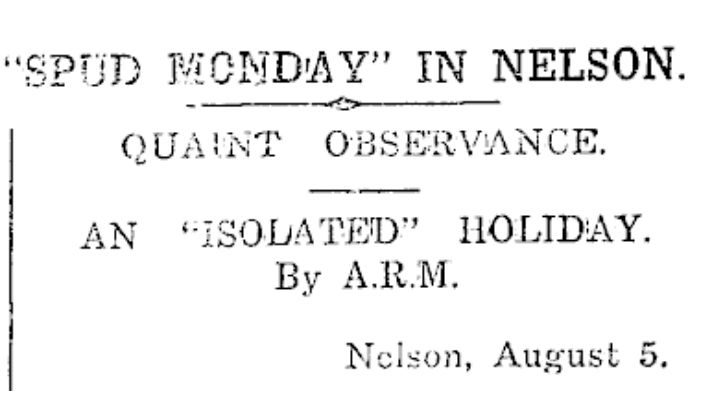‘Spud Monday’ – unique to Nelson


A quaint observation. <em>Photo: Akaroa Mail and Banks Peninsula Advertiser 1930.</em>
‘Spud Monday’, the first Monday in August was, for a long time, a public holiday, observed only in the Nelson district.
Although initially seen by some to be inconvenient and unnecessary it became very popular, with sports fixtures and other events organised around the district. ‘Six a side’ ladies hockey tournaments and ‘seven a side’ football, were held predominantly at Botanical Reserve and Trafalgar Park each year. Almost every community had one or more events planned for each holiday. In 1923, Motueka ran a golf tournament and tombstone competition, 1924 - Appleby Gun Club held a very popular shooting event, 1926 - Wakefield ran a bowls tournament where winners received a cup and runner-ups a large potato. Tahuna organised a beach day gala with proceeds to go to Tahuna Fire Brigade in 1928 and wrestling occurred at the Theatre Royal in 1936.
But what was Spud Monday’s origin? Over the years there have been two main versions. No.1 – it was introduced after early settlers, who had run out of food and were so hungry that they dug up their seed potatoes to eat. No.2 - in 1871 the British Parliament established four new public holidays in the year, Easter Monday, Whit Monday, the first Monday in August (Lammas Monday), and Boxing Day. Mr Samuel Strong, a ledger keeper for Nathaniel Edwards and Co, after returning to Nelson following a holiday in England, was sent a copy of the London Times in which the new holidays were mentioned. The August holiday in England gave workers who had toiled all through the summer months a well-needed break.
Mr Strong showed this paper to employees in the various departments of the warehouse, explaining that he thought, it would be a great benefit to workers in Nelson if they could observe a new holiday as well, especially when they had to work a lot of overtime during June and July when stocktaking and balancing was done. Assisted by Mr T. Usher, two petitions were prepared to present to Nelson Provincial Council, one from wholesalers and one from retailers. Strong solicited signatures from wholesalers and Usher from the retailers. Usher’s success was, in his own words, a failure with only three retailers signing. The Provincial Council accepted the petitions and granted and gazetted the holiday. Initially, not all places of business closed.
Coincidentally, the first Monday in August was also the day to plant potatoes for an early crop. As it fell on the same day as the new holiday it eventually became more commonly known as ‘Spud Monday’.
By 1938, owing to the 40-hour and five-day week, the continuation of the holiday became uncertain. In November, a unanimous decision was made by employers that they would no longer recognise ‘Spud Monday’ as a holiday. As a result, there was huge public opposition. Many businesses continued to observe the day but eventually it was completely abandoned.
